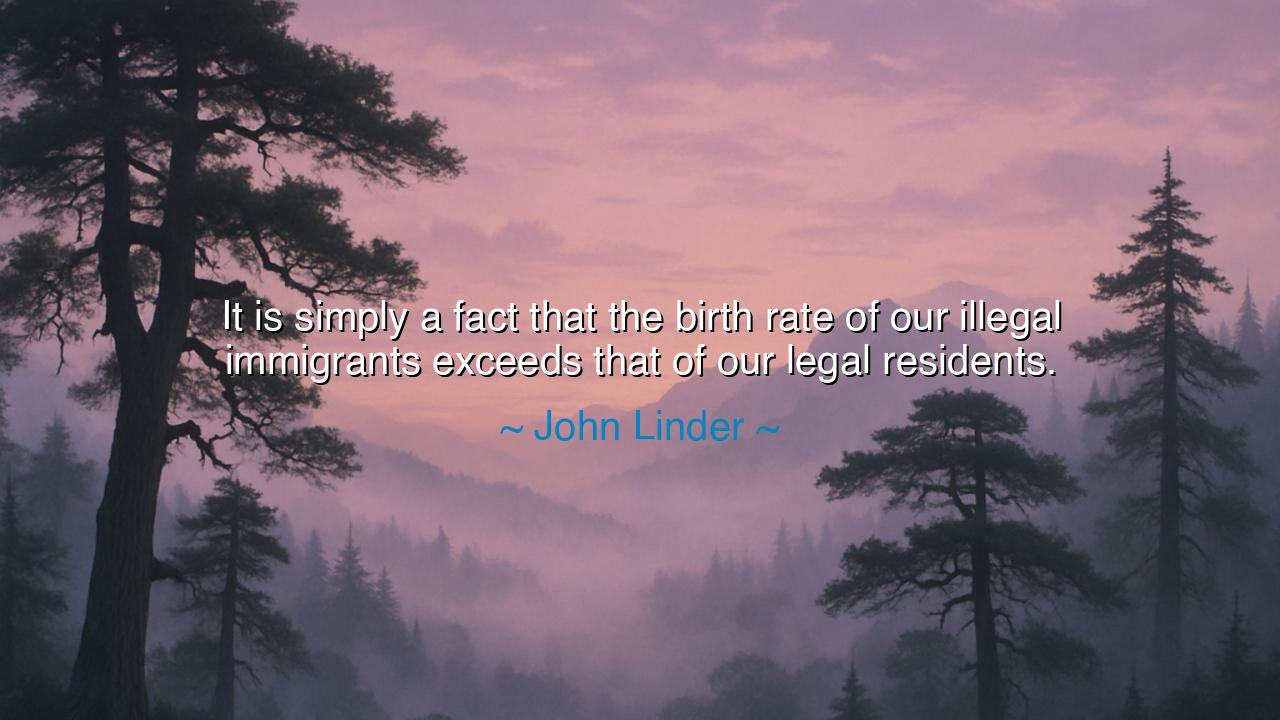
It is simply a fact that the birth rate of our illegal immigrants
It is simply a fact that the birth rate of our illegal immigrants exceeds that of our legal residents.






When John Linder stated, “It is simply a fact that the birth rate of our illegal immigrants exceeds that of our legal residents,” he spoke not as a scientist observing numbers, but as a lawmaker sounding an alarm about the changing currents of a nation. His words touch upon a subject that lies deep in the heart of every civilization — the question of growth, identity, and law. To the wise ear, this quote is not merely about population; it is about the balance between order and destiny, between those who build within the boundaries of law and those who live outside its reach.
The origin of this statement lies in the early years of the twenty-first century, when America was in the midst of fierce debates over immigration policy and demographic change. John Linder, a congressman from Georgia, sought to draw attention to what he saw as an overlooked reality: that the birth rates among undocumented immigrants were outpacing those of the nation’s legal citizens. To him, this was not just a statistic — it was a sign of imbalance, a potential shift in the social fabric that could reshape the country’s future. His words carried both warning and lament, for they reflected a fear that law, once weakened, might no longer guide the destiny of the people who depend on it.
Yet beneath the politics lies a deeper truth about the nature of civilization itself. Every society must decide how it will grow — whether through lawful structure or unrestrained expansion. The ancients knew that unchecked growth, whether of empire or population, could bring both vitality and peril. In ancient Rome, for example, the influx of peoples from conquered lands enriched the empire with labor and culture, yet also strained its unity and blurred its identity. The Romans, like Linder, wrestled with a fundamental tension: how to preserve the order of citizenship while welcoming the vitality of the outsider. The lesson of history is that both excess rigidity and excess leniency can destroy the harmony of nations.
In speaking of birth rates, Linder was also invoking a metaphor — the renewal of the nation’s bloodline, both literal and cultural. He feared that when law is not the mother of growth, chaos becomes its father. His tone, though factual, conceals a moral appeal: that every generation must ensure that its laws are strong enough to channel the forces of change, lest those forces erode the foundations that sustain them. For in every age, growth without law breeds uncertainty, and compassion without order becomes cruelty in disguise.
However, wisdom demands that we listen not only to fear, but also to understanding. For those whom Linder called “illegal immigrants” are not shadows or threats, but people — often driven by desperation, seeking what every human seeks: safety, work, and the hope of a better life for their children. Their higher birth rate can be seen not merely as a problem, but as a reflection of hope reborn in difficult soil. History reminds us that even the most powerful nations have been renewed by those once cast out. The Israelites were refugees in Egypt before they became a people. The early settlers in the New World were themselves exiles seeking opportunity. Thus, while law must stand firm, mercy must never vanish from the heart of the nation.
Still, the lesson in Linder’s words remains vital. The balance between law and compassion is the test of a civilization’s maturity. A nation that abandons law loses its shape, but a nation that forgets compassion loses its soul. The wise statesman, like a careful gardener, must prune without uprooting, must guide growth without extinguishing it. This is the challenge that Linder’s warning presents — to find a way where law protects dignity, and dignity strengthens law.
So let his words be remembered not as a cry of division, but as a call to wisdom. Population is not merely a number — it is the mirror of a people’s character and destiny. Every nation must decide whether its growth will be governed by chaos or by conscience, by emotion or by order. And thus the teaching endures: build laws that are just, and build hearts that are merciful, so that the children of all — both native and foreign-born — may inherit not a nation divided by fear, but a homeland united by fairness, purpose, and hope.






AAdministratorAdministrator
Welcome, honored guests. Please leave a comment, we will respond soon